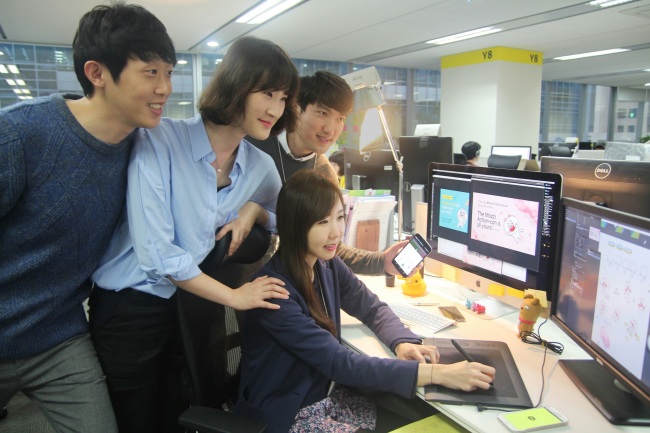What do hot K-pop stars, such as TVXQ, EXO and Girl’s Day, and superheroes of the upcoming Hollywood film “Avengers: the Age of Ultron” have in common? They have all been made into mobile emoticons on South Korea’s most-used mobile messenger KakaoTalk, run by Internet giant Daum Kakao.
The emoticon ― a combination of emotion and icon ― started out as creative combinations of numbers, letters and punctuation marks, but have evolved into today’s animated characters moving around a mobile chat room, speaking sweet words or sometimes playing pranks.
The people behind the creation of the thumbnail-sized emoticons on KakaoTalk are software developers and engineers on the company’s digital items team.
 |
| Members of the KakaoTalk digital items team at Daum Kakao work on emoticons. (Daum Kakao) |
Around 20 members on the team are not actually designing the characters themselves. They do all the other work behind the scenes from scratch including making decisions on the location of emoticons in chat rooms and on pixel values (brightness level of each pixel) of characters, and running tests to check if emoticons appear properly on all devices.
“It takes up to three months to complete the processes before publishing one package of emoticons, but the time-consuming work to create nonverbal communication tools is so much fun,” Heather Yeon, director of the digital items team, told The Korea Herald in a recent interview at the firm’s renovated headquarters in Pangyo, Gyeonggi Province.
“Many employees at Daum Kakao hope to join the team that develops what we call the second language, enabling messenger users to express subtle feelings and emotions effectively,” the director added.
For around 2,000 won ($1.85), less than the price of a cigarette pack or a coffee at Starbucks, KakaoTalk users can buy a set of emoticons (usually 24-40 items) to enrich their digital conversations with friends.
Emoticons now take various forms on the messenger app such as characters equipped with sound, named “Soundcons”; moving images, or animated GIFs, of celebrities, called “Realcons”; and “Actioncons,” which involves characters moving around or popping up out of nowhere, with some sounds in chat rooms.
The first Actioncons, released earlier this month, surpassed 3.5 million downloads as of last week.
Yeon said the emoticon, which is about fun, also is often more effective in delivering messages than texts.
“The team’s ultimate goal is to “help users to express all their feelings only through the emoticons.”
The emoticons, which can deliver an infinite number of different feelings, moods and emotions, bears great potential from a business perspective, according to a manager of the Daum Kakao team.
“Even though the emoticon market for mobile messenger services started receiving the limelight in earnest just three years ago, it has grown faster than the webtoon (web cartoon) market, which was created more than 10 years ago,” said Heidi Kim, senior manager of the digital items team, adding that emoticons could lead to the creation of further creative content such as animations, dramas or movies.
Kim also said the emoticon business is aimed at fostering the ecosystem of the emoticon market by giving new webtoon artists and emoticon designers an opportunity to make their names via the messenger platform.
With around 50 emoticons uploaded every day, there are now more than 100,000 emoticons featured on KakaoTalk.
Kim said the mobile messenger operator would gradually open the doors of KakaoTalk’s emoticon platform for anyone to jump into the emoticon market.
Regarding forms of emoticons in the future, Daum Kakao said it would work on developing emoticons adjusted to fit on wearable devices, such as the Apple Watch and Samsung Electronics’ smart watches.
By Kim Young-won (wone0102@heraldcorp.com)

